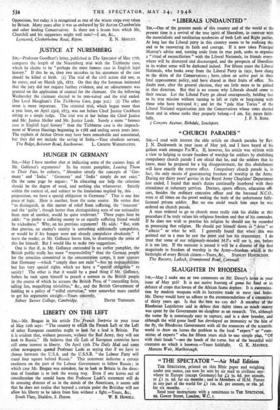JUSTICE AT NUREMBERG .
Sia,—Professor Goodhart's letter, published in The Spectatoi'of May i7th, compares the length of the Nuremberg trial with the Tichborne case, which he claims to be "perhaps the most famous case in English legal history." If this be so, then two mistakes iq his statement of the case should be killed at birth.. (i) The trial of the civil action did not, as he states, end on March 5th, 1872. On that day the foreman intimated that the jury did not require further evidence, and an adjournment was granted on the application of counsel for the claimant. On the following Wednesday the claimant elected to be non-suited and the trial ended. (See Lord Maugham's The Tichborne Case, page 312.) (2) The other error is more important. The criminal trial, which began more than a year later, on April 23rd, 1873, was not before Chief Justice Cockburn sitting as a single judge. The trial was at bar before the Chief Justice and Mr. Justice Mellor and Mr. Justice Lush. Surely a more "famous case in English legal history" than the Tichborne case is the impeach- ment of Warren Hastings beginning in 1788 and ending seven years later. The exploits of Arthur Orton may have been remarkable and sensational, but they did not include the saving Of India.—Your obedient servant,
The Ridge, BoLsover Road, Eastbourne. L. CRISPIN WARMINGTON.


























 Previous page
Previous page